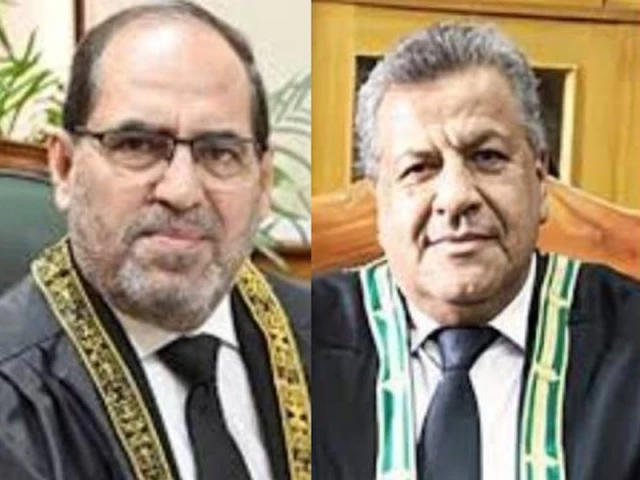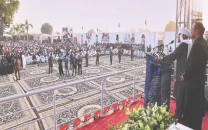'No agency role in judges' transfer'
Five IHC judges first file representations against the transfer to the then IHC chief justice Aamer Farooq

In his dissenting note in the Islamabad High Court (IHC) judges transfer case, Supreme Court judge Shakeel Ahmad has disagreed with the contention of IHC petitioner judges that intelligence agencies have a role in matters pertaining to appointment or transfer of judges.
In February this year, three judges from different high courts were transferred to the IHC, a move that was followed by changes in the IHC judges' seniority list.
Five IHC judges first file representations against the transfer to the then IHC chief justice Aamer Farooq. Upon rejection of the representations, the judges approached the SC against the transfer.
The judges contended that the transfers were prompted by a written complaint submitted by them to the then chief justice of Pakistan, Qazi Faez Isa, concerning alleged interference of intelligence agencies in IHC affairs.
On June 19, a five-member constitutional bench (CB) of the SC declared through a majority vote that transfer of judges to the IHC was not unconstitutional.
Justice Naeem Akhtar Afghan and Justice Shakeel Ahmad dissented from the majority order. However, in the 23-page dissenting order, Justice Shakeel Ahmad disagreed with the contention that new judges were transferred to the IHC at the behest of intelligence agencies.
"This argument does not appeal to me, as the intelligence agencies have no constitutional role in matters pertaining to the appointment or transfer of judges," he said.
Justice Ahmad stated that the Armed Forces, under the oath prescribed by Article 244 read with the Third Schedule of the Constitution, are bound to bear true faith and allegiance to Pakistan and to uphold the Constitution, which embodies the will of the people.
"Each member affirms that they shall serve Pakistan honestly and faithfully in the army, navy, or air force in accordance with law." The judge further stated that this oath imposes a binding obligation to refrain from any political involvement.
"In addition, Article 245(1) of the Constitution makes it clear that the Armed Forces are to act under the direction of the Federal Government to defend Pakistan against external aggression or threat of war, and, subject to law, to act in aid of civil power when called upon to do so.
"Any conduct contrary to these constitutional obligations would amount to a breach of their oath and a deviation from the role envisaged for them by the Constitution," he added.
The judge further stated that, in the larger interest of the country, in fidelity to the rule of law, and in unwavering defence of constitutionalism, it is the bounden obligation of all institutions to ensure that transient convenience does not become a precedent for permanent erosion.
Justice Ahmad, however, observed that permanent transfer of a judge from one high court to another, particularly when it disrupts established seniority in the transferee court, amounts not only to a personal injury to the judges of such a court but also to a structural threat to judicial independence.
He said that Articles 2-A and 175 of the Constitution affirm this principle, while the oath required under Articles 178 and 195, read with the Third Scheduleadministered to every Chief Justice and judge of the Supreme Court and High Courtsbinds them to discharge their duties "without fear or favour, affection or ill-will."
"This reinforces the legislative intent to achieve an impartial judiciary. Yet these words risk becoming hollow if the Executive retains the power to reward or injure a judge through permanent transfer."
Justice Shakeel Ahmad reiterated that the permanent transfer of a judge, especially when it alters the seniority structure of the transferee court, poses both a personal and institutional threat to judicial independence.
"Each High Court in Pakistan is constitutionally distinct and independent of another, headed by its own Chief Justice and governed by its own seniority list. To conflate them, or allow one to override the other, is to blur these foundational distinctions.
"This, too, reinforces that any transfer under Article 200 of the Constitution is not meant to be permanent, for permanence in this context would subvert both structure and spirit."
"The Constitution reflects deep legislative concern for judicial independence, with extensive debate devoted to securing it. For the judiciary to remain above reproach, its judges must be free from political pressure and of unimpeachable integrity."
He further noted that, taken together, these events reveal a troubling pattern of rushed decision-making, selective disclosure, and undue interference. The process, stripped of transparency and fairness, appeared to have served an ulterior purposeone that compromised the independence and internal balance of the IHC.
The judge said that it is of utmost importance to remind ourselves that the concept of independence is not confined merely to freedom from executive interference. It is far more comprehensiveencompassing immunity from all forms of pressure, whether political, economic, social, or ideological.
"It also includes freedom from biases that may arise from the background, class, or other affiliations that judges themselves may have.
"The independence of the judiciary stands as the cornerstone of our constitutional order. It must be a body well-structured, resolute, and responsive, while being equipped to swiftly address public grievances and to dispense justice with courage, clarity, and unwavering impartiality.
"An efficient and impartial judiciary nurtures a legal environment where peace prevails, rights are safeguarded, and justice knows no bias of caste, creed, colour, culture, or gender.
"Such an environment not only upholds the dignity of individuals and groups but also lays the foundation for sustained economic progress and social development, as recognised in the Zafar Ali Shah case.
"Judges must be tempered with resilient will and unwavering integrity, for upon their shoulders rests the duty of upholding the rule of lawan unbending doctrine under which no one, however exalted, stands above the law."
Justice Shakeel Ahmad noted that the Law Ministry's summary failed to address the implications of seniority and the requirement of a fresh oath for the transferee judges.
This omission, he said, suggested that complete and accurate information was not placed before the Chief Justice of Pakistan, the Chief Justices of the respective high courts, or even the transferee judges themselves.
"Such concealment points toward mala fide intent, possibly to marginalise the senior-most judges of the IHC, influence its institutional composition, or manipulate the process of appointing its Chief Justice.
"This transfer had a direct bearing on the seniority list and the composition of the IHC's Administrative Committee, both central to upholding judicial integrity.
"In my view, the deliberate withholding of information relating to seniority and oath-taking requirements amounts to a violation of the rule of fairness and undermines the principles of transparency and judicial independence," he added.

























COMMENTS
Comments are moderated and generally will be posted if they are on-topic and not abusive.
For more information, please see our Comments FAQ